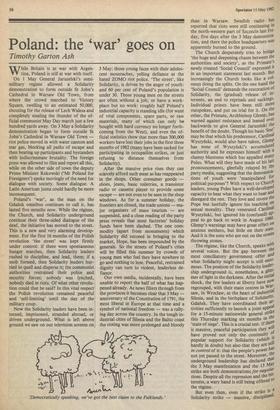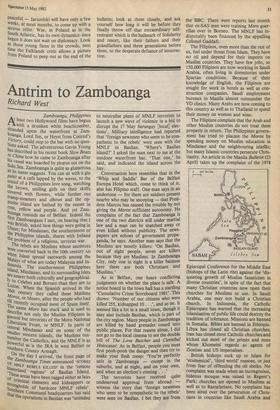Poland: the `war' goes on
Timothy Garton Ash
While Britain is at war with Argen- tina, Poland is still at war with itself. On 1 May General Jaruzelski's semi- military regime allowed a Solidarity demonstration to form outside St John's Cathedral in Warsaw Old Town, from where the crowd marched to Victory Square, swelling to an estimated 50,000, shouting for the release of Lech Walesa and completely stealing the thunder of the of- ficial communist May Day march just a few hundred yards away. On 3 May a Solidarity demonstration began to form outside St John's Cathedral in Warsaw Old Town riot police moved in with water cannon and tear gas, blocking all paths of escape and then beating up participants and bystanders with indiscriminate brutality. The foreign press was allowed to film and report all this, while on the other side of town the deputy Prime Minister Rakowski (`Mr Poland for Foreigners') spoke movingly of the need for dialogue with society. Some dialogue. A Latin American junta could hardly be more inconsequent.
Poland's 'war', as the man on the Gdansk omnibus continues to call it, has lasted five months now. While the regime, the Church, and Solidarity underground continue their three-sided dialogue of the deaf, the initiative has moved to the street. This is a new and very alarming develop- ment. For the first 16 months of the Polish revolution 'the street' was kept firmly under control: if there were spontaneous I hunger marches, then Solidarity leaders rushed to discipline, and lead, them; if a mob formed, then Solidarity leaders hur- ried to quell and disperse it; the communist, authorities restrained their police and security forces; nobody was lynched, nobody died in riots. Of what other revolu- tion could that be said? In this vital respect the Polish revolution remained peaceful and 'self-limiting' until the day of the military coup.
Now the Solidarity leaders have been in- terned, imprisoned, stranded abroad, or driven underground. What is left above ground we saw on our television screens on 3 May: those young faces with their adoles- cent moustaches, yelling defiance at the hated ZOMO riot police. 'The street', like Solidarity, is driven by the anger of youth: and 60 per cent of Poland's population is under 30. Those young men on the streets are often without a job, or have a work- place but no work: roughly half Poland's industrial capacity is standing idle (for want of vital components, spare parts, or raw materials, many of which can only be bought with hard currency no longer forth- coming from the West), and even the of- ficial statistics show that more than 300,000 workers have lost their jobs in the first three months of 1982 (many have been sacked for participating in occupation strikes, or just refusing to distance themselves from Solidarity).
After the massive price rises they can scarcely afford such meat as has reappeared in the shops. Other consumer goods shoes, jeans, basic toiletries, a transistor radio or cassette player to provide some escape — are not even to be seen in the shop windows. As for a summer holiday, the frontiers are closed, the trade unions — ma- jor organisers of mass tourism — are suspended, and a close reading of the party press reveals that most factories' holiday funds have been slashed. The one com- modity (apart from monuments) which Solidarity did succeed in bringing to the market, Hope, has been impounded by the generals. So the streets of Poland's cities will be filled this summer by crowds of young men who feel they have nowhere to go and nothing to lose. Peaceful, restrained dignity can turn to violent, leaderless de- fiance.
Our own media, incidentally, have been unable to report the half of what has hap- pened already. As news filters through from the provinces it becomes clear that 3 May anniversary of the Constitution of 1791, the most liberal in Europe at that time and a symbol of national freedom — was a rally- ing day across the country. In the tough in- dustrial cities of Silesia and the Baltic coast the rioting was more prolonged and bloody
Democratically speaking, we've got the best claim to the Falklands.'
than in Warsaw. Swedish radio has reported that riots were still continuing in the north-western part of Szczecin last Fri- day, five days after the 3 May demonstra- tion, and there the police headquarters was apparently burned to the ground.
The Church desperately tries to bridge `the huge and deepening chasm between the authorities and society', as the Primate's newly created 'Social Council' expressed it in an important statement last month. But increasingly the Church looks like a col- ossus doing the splits. On the one hand the `Social Council' demands the restoration of
in-
ternees, the (gradual) release of an end to reprisals and sackings. Individual priests have been still more outspoken, and put on trial for it. On the
other, the Primate, Archbishop Glemp, has warned against resistance and leaned over backwards to give General Jaruzelski the benefit of the doubt. Though his basic 'line
may be that which his predecessor, Cardinal Wyszyfiski, would also have taken, GleniP
has none of Wyszyfiski's accumulated
authority and he expresses himself with a clumsy bluntness which has appalled many Poles. What will they have made of his last
pronouncements, gleefully relayed by the party media, suggesting that the demonstra- tions of youth were 'manipulated for political purposes'? With respect to Church leaders, young Poles have a well-developed
capacity to hear what they want to hear and disregard the rest. They love and revere the Pope but lustfully ignore his teaching on, sexual morality. They venerated Cardinal
Wyszyfiski, but ignored his (confused) ap- peal to go back to work in August 1980.
Glemp's warnings may have great effect on anxious mothers, but little on their sons. And it is the sons who are out on the streets throwing stones.
The regime, like the Church, speaks with several voices. But the gap between the,
most conciliatory government offer an
what. Solidarity might accept is still enor- mous. The position of the Solidarity leader- ship underground is, nonetheless, a 81011,_,-
mer of light in the darkness. After the initial shock, the few leaders at liberty have no's
regrouped, with their main centres in War- saw, in Wroclaw, at the heart of industrial Silesia, and in the birthplace of SolidaritY,
Gdansk. They have coordinated their ac-
tivities sufficiently to launch a joint apPeal for a 15-minute nationwide general strike this Thursday marking six months in the 'state of siege'. This is a crucial test. If there, is massive, peaceful participation they have proved not only the continuity of popular support for Solidarity (which hardly in doubt) but also that they are still in control of it: that the people's power has not yet passed to the street. Moreover, the
underground leadership has declared that the 3 May manifestation and the 13 May
strike are both demonstrations for negotia- tions. Despite all the repression and the bit- terness, a wary hand is still being offered to the regime.
But even then, even if the strike is a Solidarity strike — massive, disciplined,
Peaceful — Jaruzelski will have only a few weeks, at most months, to come up with a serious offer. War, in Poland as in the South Atlantic, has its own dynamics: once begun it does not wait on diplomacy. Look at those young faces in the crowds, next time the Falklands crisis allows a picture from Poland to peep out at the end of the
bulletin; look at them closely, and ask yourself how long it will be before they finally throw off that extraordinary self- restraint which is the hallmark of Solidarity and resort, like their fathers and their grandfathers and three generations before them, to the desperate defiance of insurrec- tion.







































 Previous page
Previous page